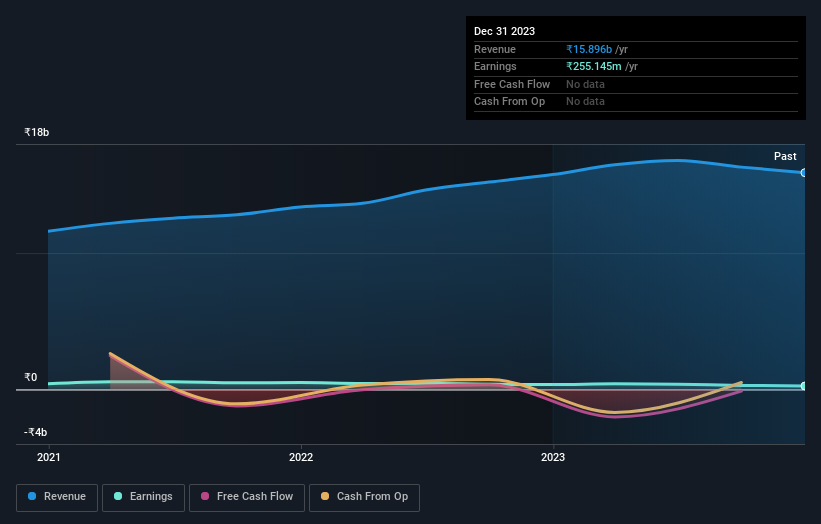Pulling back 10% this week, Everest Industries' NSE:EVERESTIND) three-year decline in earnings may be coming into investors focus
It's been a soft week for Everest Industries Limited (NSE:EVERESTIND) shares, which are down 10%. In contrast, the return over three years has been impressive. In three years the stock price has launched 262% higher: a great result. After a run like that some may not be surprised to see prices moderate. Only time will tell if there is still too much optimism currently reflected in the share price.
Although Everest Industries has shed ₹2.0b from its market cap this week, let's take a look at its longer term fundamental trends and see if they've driven returns.
Check out our latest analysis for Everest Industries
There is no denying that markets are sometimes efficient, but prices do not always reflect underlying business performance. One flawed but reasonable way to assess how sentiment around a company has changed is to compare the earnings per share (EPS) with the share price.
During the three years of share price growth, Everest Industries actually saw its earnings per share (EPS) drop 15% per year.
So we doubt that the market is looking to EPS for its main judge of the company's value. Since the change in EPS doesn't seem to correlate with the change in share price, it's worth taking a look at other metrics.
Languishing at just 0.5%, we doubt the dividend is doing much to prop up the share price. It could be that the revenue growth of 12% per year is viewed as evidence that Everest Industries is growing. In that case, the company may be sacrificing current earnings per share to drive growth, and maybe shareholder's faith in better days ahead will be rewarded.
The company's revenue and earnings (over time) are depicted in the image below (click to see the exact numbers).

This free interactive report on Everest Industries' balance sheet strength is a great place to start, if you want to investigate the stock further.
What About Dividends?
When looking at investment returns, it is important to consider the difference between total shareholder return (TSR) and share price return. The TSR is a return calculation that accounts for the value of cash dividends (assuming that any dividend received was reinvested) and the calculated value of any discounted capital raisings and spin-offs. So for companies that pay a generous dividend, the TSR is often a lot higher than the share price return. As it happens, Everest Industries' TSR for the last 3 years was 274%, which exceeds the share price return mentioned earlier. This is largely a result of its dividend payments!
A Different Perspective
Everest Industries provided a TSR of 44% over the last twelve months. But that return falls short of the market. The silver lining is that the gain was actually better than the average annual return of 20% per year over five year. This suggests the company might be improving over time. I find it very interesting to look at share price over the long term as a proxy for business performance. But to truly gain insight, we need to consider other information, too. To that end, you should learn about the 3 warning signs we've spotted with Everest Industries (including 1 which is potentially serious) .
But note: Everest Industries may not be the best stock to buy. So take a peek at this free list of interesting companies with past earnings growth (and further growth forecast).
Please note, the market returns quoted in this article reflect the market weighted average returns of stocks that currently trade on Indian exchanges.
Valuation is complex, but we're here to simplify it.
Discover if Everest Industries might be undervalued or overvalued with our detailed analysis, featuring fair value estimates, potential risks, dividends, insider trades, and its financial condition.
Access Free AnalysisHave feedback on this article? Concerned about the content? Get in touch with us directly. Alternatively, email editorial-team (at) simplywallst.com.
This article by Simply Wall St is general in nature. We provide commentary based on historical data and analyst forecasts only using an unbiased methodology and our articles are not intended to be financial advice. It does not constitute a recommendation to buy or sell any stock, and does not take account of your objectives, or your financial situation. We aim to bring you long-term focused analysis driven by fundamental data. Note that our analysis may not factor in the latest price-sensitive company announcements or qualitative material. Simply Wall St has no position in any stocks mentioned.
About NSEI:EVERESTIND
Everest Industries
Manufactures and trades in building products for residential, commercial, and industrial sectors in India and internationally.
Low risk and slightly overvalued.
Market Insights
Community Narratives



